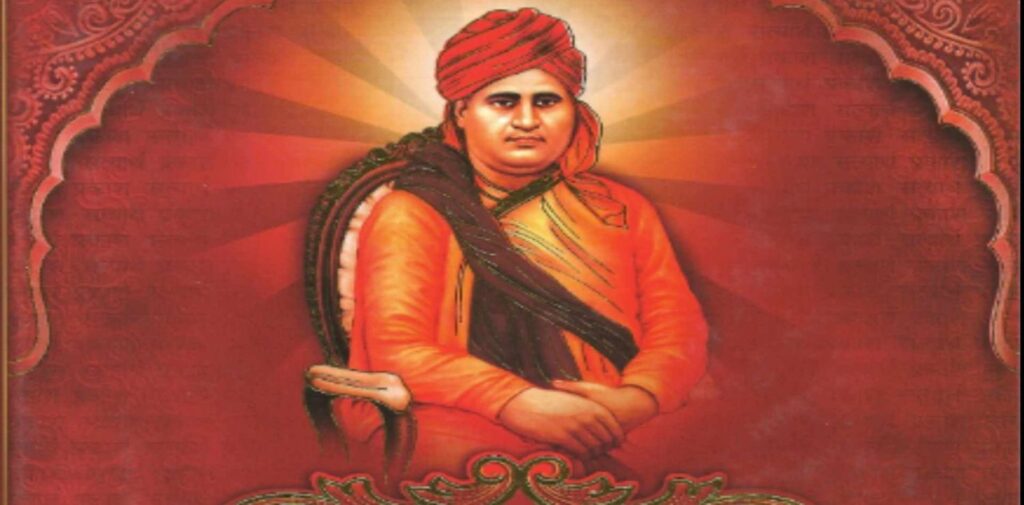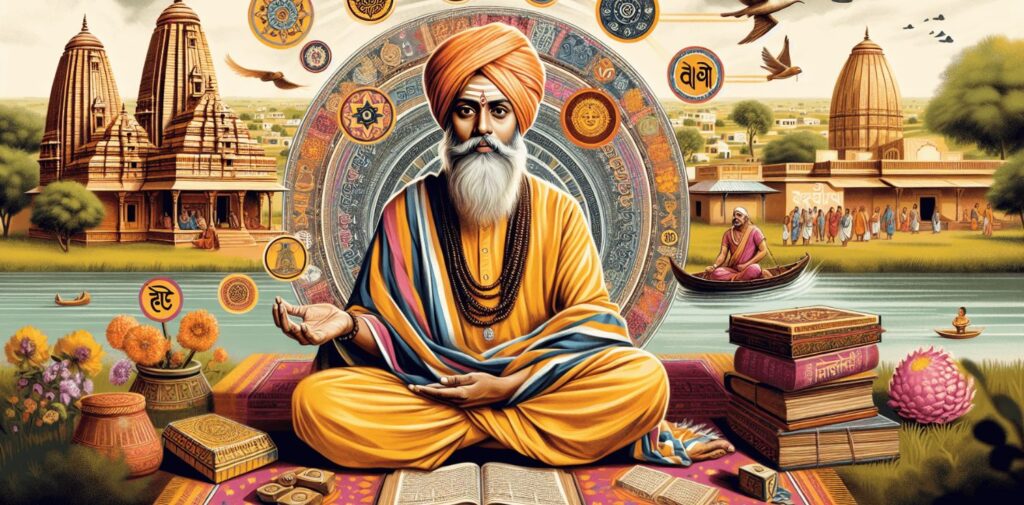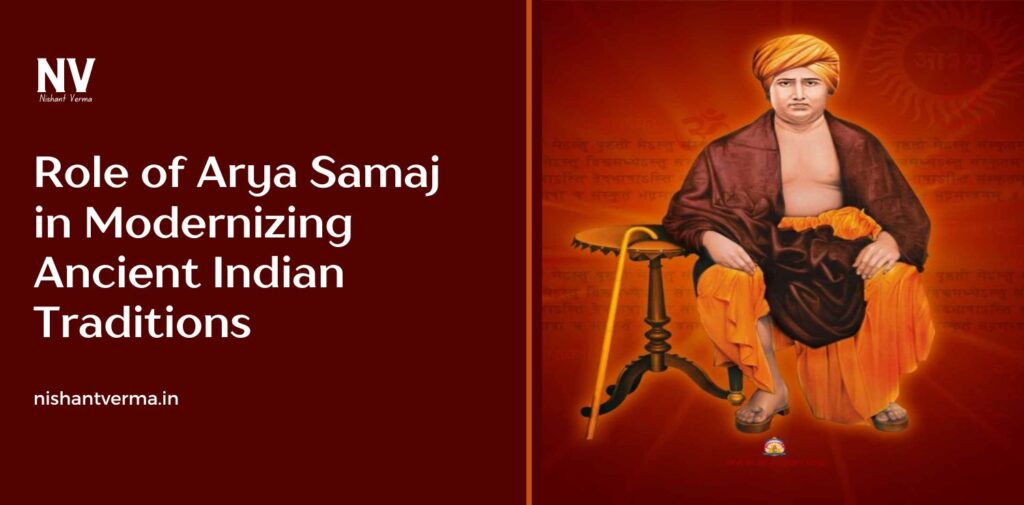India, a land of ancient culture and traditions, has always been a hub of intellectual and spiritual advancements. However, over time, many practices that were rooted in the country’s rich heritage became outdated and were often misinterpreted. During the 19th century, as India faced colonial rule and exposure to Western ideas, there was a growing realization that reforming and modernizing certain aspects of Indian society was necessary for its progress. In this context, one of the most significant social movements that contributed to this transformation was the Role of Arya Samaj.
Founded by Swami Dayananda Saraswati in 1875, the Arya Samaj played a key role in challenging the rigid social systems, outdated practices, and religious superstitions that had crept into Hindu society over centuries. It sought to return to the purest form of the Vedic teachings while promoting education, equality, and social reform. The Role of Arya Samaj significantly contributed to the modernization of ancient Indian traditions and brought about a new era of social, cultural, and educational awakening.
Swami Dayananda’s Vision: A Reformist Approach to Hinduism
Swami Dayananda Saraswati, the founder of Arya Samaj, was a visionary and reformer who aimed to reshape Indian society by revisiting its ancient scriptures. Dayananda firmly believed that the Vedas, the oldest scriptures of Hinduism, contained the most authentic and pure form of religious knowledge. However, he also recognized that over the centuries, Hinduism had been marred by superstition, ritualistic practices, and social inequalities.
Swami Dayananda’s central idea was to promote the Vedic principles of monotheism, rationality, and individual freedom while eliminating practices that did not align with these values. He was deeply critical of practices such as idol worship, caste discrimination, and child marriage, which had become widespread over time.
His reformist approach involved a deep emphasis on rational thinking, scientific temper, and humanism, which set the stage for a modernized interpretation of ancient traditions. Dayananda’s vision of Arya Samaj was to promote a society based on truth, justice, and universal brotherhood, which would allow individuals to break free from the shackles of outdated and unjust practices.

Promoting Education and Knowledge
One of the primary goals of the Arya Samaj was to spread education, particularly among the masses who were deprived of it due to social restrictions. Swami Dayananda emphasized that true progress could only occur if the people were educated and enlightened.
The Arya Samaj started many schools, colleges, and educational institutions to impart scientific knowledge and moral values. This was a crucial step in modernizing Indian society. Dayananda’s teachings encouraged individuals to question blind faith and religious dogma, promoting rationality and intellectual development instead. His educational philosophy was inclusive, advocating for the education of all sections of society, regardless of caste or gender.
Women’s education, which was a taboo in many parts of India at the time, was also actively promoted by the Arya Samaj. Swami Dayananda believed that women should be given the same opportunities for education and self-development as men. As a result, Arya Samaj opened schools specifically for girls and advocated for the upliftment of women in all spheres of life.

Challenging the Caste System and Promoting Equality
One of the most significant contributions of the Arya Samaj to modernizing Indian society was its strong stand against the caste system. The caste system, which had been rigidly entrenched in Hindu society for centuries, promoted the idea of social hierarchy based on birth rather than individual merit or capability.
Swami Dayananda was a vocal critic of this practice, which he believed contradicted the teachings of the Vedas. He argued that all individuals, regardless of their caste, should have the same rights and opportunities to worship, learn, and contribute to society. He believed that every person, by virtue of their humanity, had the right to attain spiritual knowledge and perform religious duties.
To combat the inequality caused by the caste system, Arya Samaj started offering prayers and rituals in which people from all castes could participate freely. The organization also advocated for inter-caste marriages and promoted the idea that people should be judged by their character and actions rather than their social birth.
By emphasizing the importance of human dignity and equality, the Arya Samaj became an agent of change in a society that was deeply entrenched in caste-based discrimination. It encouraged a more inclusive and egalitarian view of society, which had a profound impact on social reform movements throughout India.
Fighting Against Superstitions and Blind Faith
In the 19th century, India was deeply influenced by many superstitions, myths, and ritualistic practices that were far removed from the core teachings of the Vedas. Practices such as sati (the burning of widows), child marriage, untouchability, and idol worship had become common in many parts of the country, leading to significant suffering and social injustice.
Swami Dayananda’s Arya Samaj strongly opposed these practices, advocating for a return to the rational and moral teachings of the Vedas. He spoke out against blind rituals and superstitions that served to keep people in ignorance and fear. Swami Dayananda urged people to use their intellect and reasoning to question religious practices that did not align with moral and ethical principles.
Dayananda’s famous slogan “Go back to the Vedas” was a call for the people to rediscover the ancient wisdom of their scriptures, which he believed were a source of true knowledge and enlightenment. By promoting a scientific and rational approach to spirituality, the Arya Samaj helped create a society that valued knowledge over superstition, reasoning over blind faith, and social progress over outdated traditions.
Reforming Religious Practices
The Arya Samaj also worked toward reforming religious practices in Hinduism. Swami Dayananda’s belief in monotheism led to the rejection of idol worship, which was widespread in many parts of India at the time. Instead, he advocated for the worship of one formless God, which he believed was a more rational and pure form of spirituality.
The Arya Samaj also sought to reintroduce Vedic rituals that were simple, meaningful, and devoid of the superstitions that had crept into Hindu religious practices over time. It encouraged people to follow the teachings of the Vedas in their purest form, focusing on the worship of one Supreme Being and engaging in practices that were intellectually and spiritually fulfilling.
The reform of religious practices by Arya Samaj had a lasting impact on Hinduism. It created a space for a more enlightened and progressive form of spirituality, which emphasized devotion, ethics, and moral conduct while rejecting meaningless rituals.

Impact on Society and the Freedom Struggle
The Arya Samaj was not just an intellectual movement but also played an active role in social and political life. It contributed significantly to the Indian freedom struggle by creating awareness among people and encouraging them to fight against colonial rule and social injustice. The Arya Samaj’s teachings of equality, liberty, and social reform inspired leaders like Lala Lajpat Rai and Swami Shraddhanand, who were deeply involved in the fight for India’s independence.
The organization also became involved in many social issues, including the fight against child marriage, the promotion of widow remarriage, and the abolition of untouchability. Arya Samaj’s efforts to promote education, particularly for women and marginalized communities, laid the groundwork for future social reforms.
Conclusion: Role of Arya Samaj
The Arya Samaj played an indispensable role in modernizing ancient Indian traditions. By promoting education, equality, and rational thinking, it challenged many of the outdated practices and superstitions that had crept into Indian society. Swami Dayananda’s call to return to the Vedas provided a foundation for a more progressive and enlightened view of Hinduism, which balanced spiritual wisdom with practical social reforms.
The impact of Arya Samaj is still felt today. Its teachings continue to inspire people around the world to live meaningful, ethical, and socially responsible lives. The Arya Samaj’s commitment to equality, justice, and the well-being of society helped transform India into a more progressive nation, shaping the country’s modern identity. Through its dedication to rationality, education, and social justice, the Arya Samaj played a crucial role in making ancient Indian traditions relevant in the modern world.




